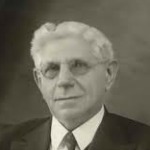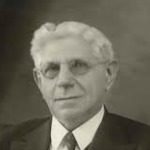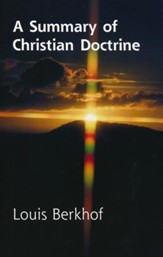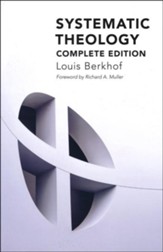
Quotes by Louis Berkhof
It is sometimes said that the doctrine of predestination exposes God to the charge of injustice. But this is hardly correct. We could speak of injustice only if man had a claim on God, and God owed man eternal salvation. But the situation is entirely different if all men have forfeited the blessings of God, as they have. No one has the right to call God to account for electing some and rejecting others. He would have been perfectly just, if He had not saved any, Matt. 20:14, 15; Rom. 9:14, 15.
Summary of Christian Doctrine, Part II: The Doctrine of God and Creation, Chapter VIII: The Divine Decrees.
[Grace is] the free bestowal of kindness on one who has no claim to it.
The doctrine of the perseverance of the saints is to the effect that they whom God has regenerated and effectually called to a state of grace, can neither totally nor finally fall away from that state, but shall certainly persevere therein to the end and be eternally saved.
The decree of God is founded in wisdom, Eph. 3:9-11, though we do not always understand it. It was formed in the depths of eternity, and is therefore eternal in the strictest sense of the word, Eph. 3:11. Moreover, it is effectual, so that everything that is included in it certainly comes to pass, Isa. 46:10. The plan of God is also unchangeable, because He is faithful and true, Job 28:13, 14; Isa. 46:10; Luke 22:22. It is unconditional, that is, its execution does not depend on any action of man but even renders such action certain, Acts 2:23; Eph. 2:8. Moreover, it is all-inclusive, embracing the good and the wicked actions of men, Eph. 2:10; Acts 2:28, contingent events, Gen. 50:20, the duration of man’s life, Job 14:5; Ps. 39:4, and the place of his habitation, Acts 17:26. With respect to sin it is permissive.
Summary of Christian Doctrine, Part II: The Doctrine of God and Creation, Chapter VIII: The Divine Decrees.
The decree of God is His eternal plan or purpose, in which He has foreordained all things that come to pass. Since it includes many particulars, we often speak of the divine decrees in the plural, though in reality there is but a single decree. It covers all the works of God in creation and redemption, and also embraces the actions of men, not excluding their sinful deeds. But while it rendered the entrance of sin into the world certain, it does not make God responsible for our sinful deeds. His decree with respect to sin is a permissive decree.
Summary of Christian Doctrine, Part II: The Doctrine of God and Creation, Chapter VIII: The Divine Decrees.
According to Scripture the essence of man consists in this, that he is the image of God. As such he is distinguished from all other creatures and stands supreme as the head and crown of the entire creation.
Sanctification is a work of the Triune God, but is ascribed more particularly to the Holy Spirit in Scripture… Though man is privileged to cooperate with the Spirit of God, he can do this only in virtue of the strength which the Spirit imparts to him from day to day. The spiritual development of man is not a human achievement but a work of divine grace. Man deserves no credit whatsoever for that which he contributes to it instrumentally.
The Trinity is a mystery…man cannot comprehend it and make it intelligible. It is intelligible in some of its relations and modes of manifestation, but unintelligible in its essential nature…. The real difficulty lies in the relation in which the persons in the Godhead stand to the divine essence and to one another; and this is a difficulty which the Church cannot remove, but only try to reduce to its proper proportion by a proper definition of terms. It has never tried to explain the mystery of the Trinity but only sought to formulate the doctrine of the Trinity in such a manner that the errors which endangered it were warded off.
This is quite essential for maintaining the purity of doctrine and for guarding the holiness of the sacraments. Churches that are lax in discipline are bound to discover sooner or later within their circle an eclipse of the light of the truth and an abuse of that which is holy. Hence a Church that would remain true to her ideal in the measure in which this is possible on earth, must be diligent and conscientious in the exercise of Christian discipline. The Word of God insists on proper discipline in the Church of Christ (Mt. 18:18; 1 Cor. 5:1-5, 13; 14:33, 40; Rev. 2:14, 15, 20).
Systematic Theology, by permission of Banner of Truth, Carlisle, PA. 1998, p. 578. Get this book!
In God there are no three persons alongside of, and separate from, one another, but only personal self-distinctions within the Divine essence, which is not only generically, but also numerically, one.
Systematic Theology, by permission of Banner of Truth, Carlisle, PA. 1998, p. 87. Get this book!
[The church] has never tried to explain the mystery of the Trinity, but only sought to formulate the doctrine of the Trinity in such a manner that the errors which endangered it were warded off.
Systematic Theology, by permission of Banner of Truth, Carlisle, PA. 1998, p. 89. Get this book!
The divine essence is not divided among the three persons, but is wholly with all its perfection in each one of the persons so that they have a numerical unity of essence.
Systematic Theology, by permission of Banner of Truth, Carlisle, PA. 1998, p. 88. Get this book!
Strictly speaking, it may be said that the true preaching of the Word and its recognition as the standard of doctrine and life, is the one mark of the Church. Without it there is no Church.
Systematic Theology, by permission of Banner of Truth, Carlisle, PA. 1998, p. 577. Get this book!
[The] Church is said to be invisible, because she is essentially spiritual and in her spiritual essence cannot be discerned by the physical eye; and because it is impossible to determine infallibly who do and who do not belong to her.
Systematic Theology, by permission of Banner of Truth, Carlisle, PA. 1998, p. 565, 566. Get this book!
In concise terms common grace may be defined as “the unmerited favor of God toward all men displayed in His general care for them” (Ryrie). An expanded definition of common grace is “(a) those general operations of the Holy Spirit whereby He, without renewing the heart, exercises such a moral influence on man through His general or special revelation, that sin is restrained, order is maintained in social life, and civil righteousness is promoted; or, (b) those general blessings, such as rain and sunshine, food and drink, clothing and shelter, which God imparts to all men indiscriminately where and in what measure it seems good to Him.”
Systematic Theology, Banner of Truth, p. 436. Get this book!
It does not seem proper to speak of one attribute of God as being more central and fundamental than another; but if this were permissible, the Scriptural emphasis on the holiness of God would seem to justify its selection.
Systematic Theology, by Permission of Banner of Truth, p. 73. Get this book!
The denial of the doctrine of perseverance virtually makes the salvation of man dependent on the human will rather than on the grace of God.
Systematic Theology, by permission of Banner of Truth, Carlisle, PA. 1998, p. 549. Get this book!
Perseverance may be defined as that continuous operation of the Holy Spirit in the believer, by which the work of divine grace that is begun in the heart, is continued and brought to completion. It is because God never forsakes His work that believers continue to stand to the very end.
Systematic Theology, by permission of Banner of Truth, Carlisle, PA. 1998, p. 546. Get this book!
It is possible that some who belong to the invisible Church never become members of the visible organization… On the other hand there may be unregenerate (people) who, while professing Christ, have no true faith in Him…and these, as long as they are in that condition, do not belong to the invisible Church.
Systematic Theology, by permission of Banner of Truth, Carlisle, PA. 1998, p. 566. Get this book!
True liberty consists exactly in self-determination in the direction of holiness. Man is never more free than when he moves consciously in the direction of God.
Systematic Theology, by permission of Banner of Truth, Carlisle, PA. 1998, p. 548. Get this book!
Strictly speaking, it may be said that the true preaching of the Word and its recognition as the standard of doctrine and life, is the one mark of the Church. Without it there is no Church, and it determines the right administration of the sacraments and the faithful exercise of Church discipline. Nevertheless, the right administration of the sacraments is also a real mark of the Church. And though the exercise of discipline may not be peculiar to the Church, that is, is not found in it exclusively, yet it is absolutely essential to the purity of the Church.
Systematic Theology, by permission of Banner of Truth, Carlisle, PA. 1998, p. 577. Get this book!
If the Church on earth is the militant Church, the Church in heaven is the triumphant Church… In these two stages of her existence the Church reflects the humiliation and exaltation of her heavenly Lord.
Systematic Theology, by permission of Banner of Truth, Carlisle, PA. 1998, p. 565. Get this book!
Moreover, true repentance never exists except in conjunction with faith, while on the other hand, wherever there is true faith, there is also real repentance. The two are but different aspects of the same turning-a turning away from sin in the direction of God. The two cannot be separated; they are simply complementary parts of the same process.
Systematic Theology, by permission, Banner of Truth, Carlisle, PA. 1998, p. 487. Get this book!


